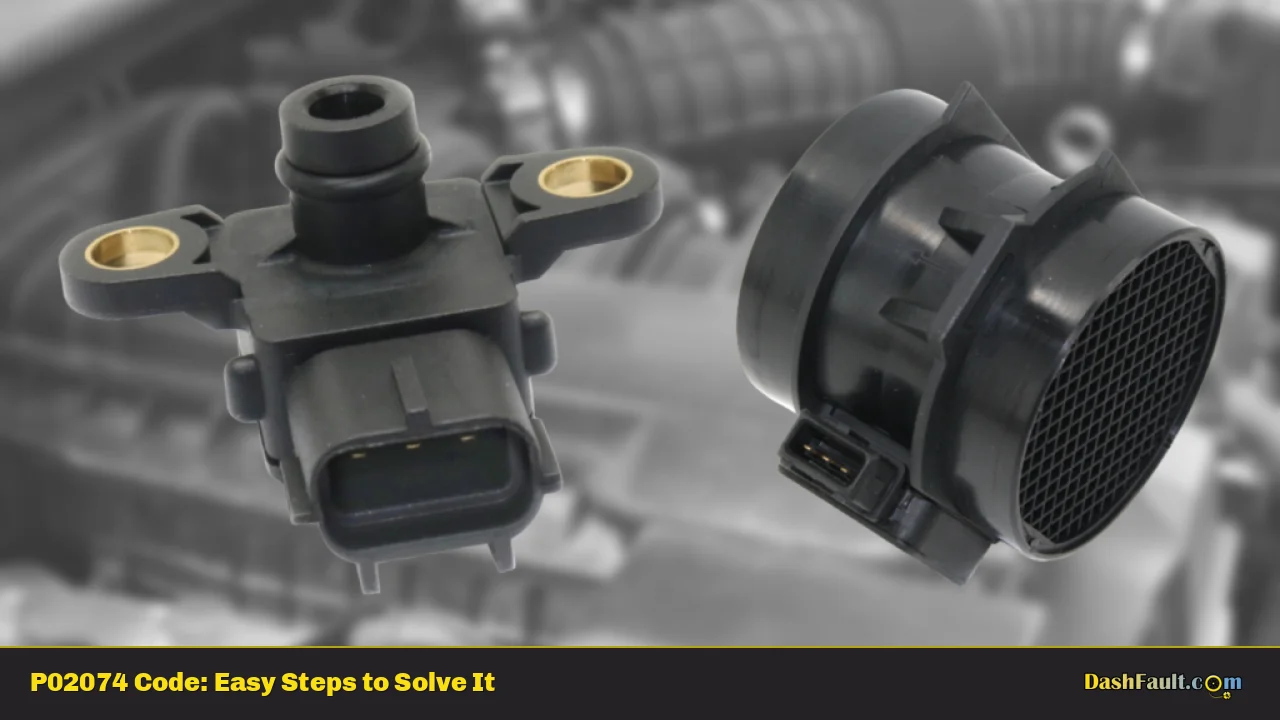The P2074 trouble code is a diagnostic trouble code (DTC) that signifies a problem with the correlation between the manifold absolute pressure (MAP) sensor, mass airflow (MAF) sensor, and throttle position sensor (TPS) under higher engine load conditions. When the powertrain control module (PCM) detects a discrepancy between the expected and actual readings from these sensors, it triggers the P2074 code. This code is critical as it can lead to poor engine performance, increased emissions, and reduced fuel efficiency if not addressed promptly.
| P2074 Code Meaning | P2074 Code Common Causes |
|---|---|
| Manifold Absolute Pressure/Mass Air Flow – Throttle Position Correlation at Higher Load | Faulty MAF or MAP sensor |
| Indicates a disagreement between MAF and throttle position during high load conditions | Bad throttle position sensor |
| Triggered when the PCM detects unexpected values from sensors | Vacuum leaks in the intake system |
| Internal engine problems | |
| Wiring issues or bad connections | |
| Faulty PCM or software issues |
Symptoms of P2074 Code
Understanding the symptoms associated with the P2074 code is crucial for timely diagnosis and repair. Common symptoms include:
- Illuminated check engine light
- Poor acceleration or sluggish performance
- Increased fuel consumption
- Engine stalling or hesitation
- Rough idling or misfiring
Technical Explanation of P2074 Code
The P2074 code indicates that there is a correlation issue between the MAP sensor, MAF sensor, and TPS when the engine is under high load. The PCM uses data from these sensors to calculate the optimal air-fuel mixture for combustion. If the throttle plate is open (indicating high demand for power), but the MAF sensor does not register an increase in airflow, this discrepancy will trigger the P2074 code.
Step-by-Step Diagnosis of P2074 Code
Diagnosing the P2074 code involves several steps:
- Scan for Codes: Use an OBD-II scanner to confirm that P2074 is present along with any other codes.
- Check Freeze Frame Data: Analyze freeze frame data to understand under what conditions the code was triggered.
- Inspect Wiring and Connectors: Examine all wiring and connectors related to the MAP, MAF, and TPS for damage or corrosion.
- Test Sensors: Use a multimeter to test the voltage and resistance of the MAP, MAF, and TPS sensors against manufacturer specifications.
- Check for Vacuum Leaks: Inspect hoses and connections for any signs of vacuum leaks that could affect sensor readings.
- Examine Air Filter: Ensure that the air filter is clean and not obstructing airflow.
Solution Methods for P2074 Code
Once diagnosed, resolving the P2074 code typically involves one or more of the following solutions:
- Replace Faulty Sensors: If testing reveals that any of the MAP, MAF, or TPS sensors are faulty, they should be replaced.
- Repair Wiring Issues: Fix any damaged wiring or poor connections found during inspection.
- Eliminate Vacuum Leaks: Repair any identified vacuum leaks in hoses or connections.
- Update PCM Software: If applicable, ensure that the PCM software is up-to-date to prevent miscommunication between components.
Cost Estimates
The cost of repairs can vary widely based on vehicle make and model as well as labor rates in your area:
- MAF Sensor Replacement: $150 – $300
- MAP Sensor Replacement: $100 – $250
- Throttle Position Sensor Replacement: $100 – $200
- Labor Costs: Typically range from $75 to $150 per hour depending on location.
Warnings and Recommendations
When dealing with DTCs like P2074:
- Always consult your vehicle’s service manual for specific diagnostic procedures related to your make and model.
- If you are unsure about any step in diagnosing or repairing this issue, it is advisable to seek professional assistance.
- Ignoring this trouble code may lead to more severe engine problems over time.
Closing Paragraph
The P2074 trouble code serves as an important indicator of potential issues within your vehicle’s air intake system. By understanding its meaning, symptoms, causes, and solutions, vehicle owners and DIY mechanics can effectively diagnose and address this problem. Regular maintenance and timely repairs are essential to ensure optimal engine performance and longevity.
Frequently Asked Questions About P2074
- What does the P2074 code mean?
The P2074 code indicates a correlation issue between the manifold absolute pressure (MAP) sensor, mass airflow (MAF) sensor, and throttle position sensor (TPS) at higher engine loads. - What are common symptoms of a P2074 code?
Common symptoms include an illuminated check engine light, poor acceleration, increased fuel consumption, engine stalling, and rough idling. - How can I diagnose a P2074 code?
Diagnosing a P2074 code involves scanning for codes, checking freeze frame data, inspecting wiring and connectors, testing sensors, checking for vacuum leaks, and examining the air filter. - What are potential causes of a P2074 code?
Potential causes include faulty MAP or MAF sensors, bad throttle position sensors, vacuum leaks in the intake system, internal engine problems, wiring issues, or faulty PCM. - What should I do if I see a P2074 code?
If you see a P2074 code, start by diagnosing using an OBD-II scanner and inspecting relevant components before considering repairs. - Can I drive my vehicle with a P2074 code?
While it may be possible to drive with this code present, it is not recommended as it can lead to reduced performance and increased emissions. - How much does it cost to fix a P2074 code?
The cost to fix a P2074 code can range from $100 to $300 depending on which components need replacement or repair. - When should I seek professional help for a P2074 code?
If you are unable to diagnose or fix the issue after following standard troubleshooting steps, it’s best to seek professional assistance.
